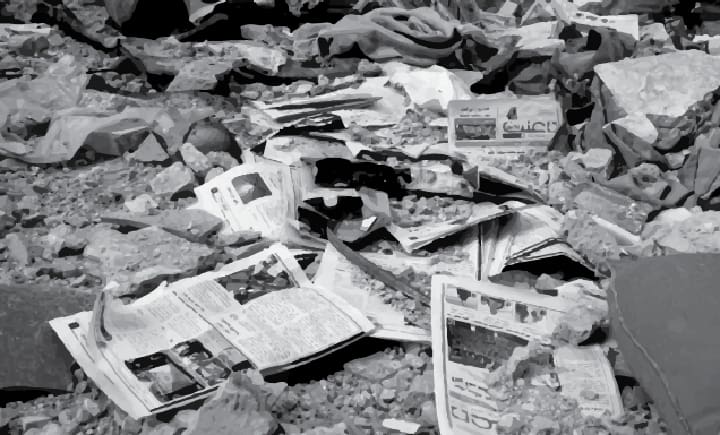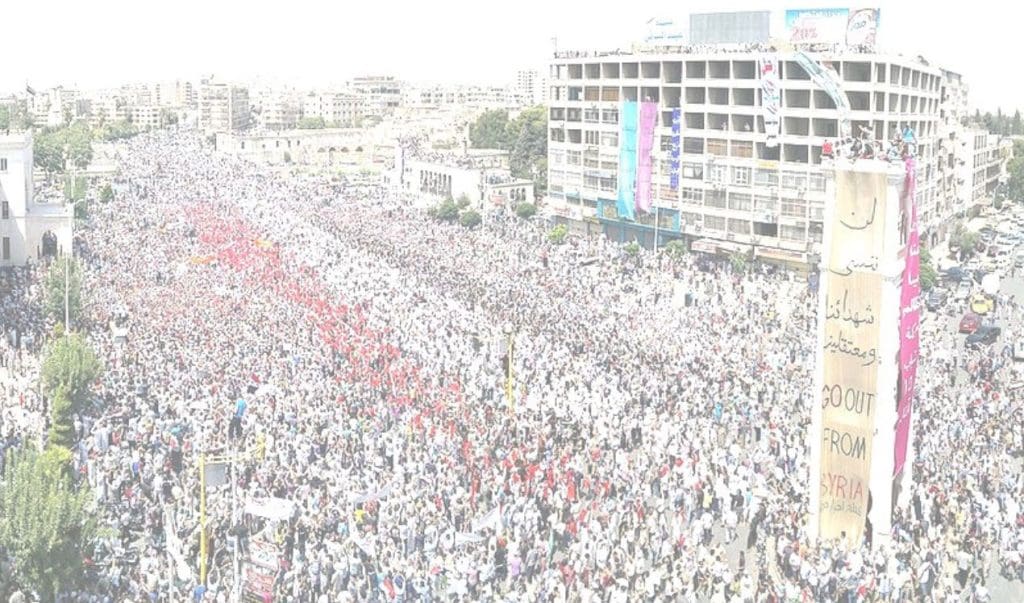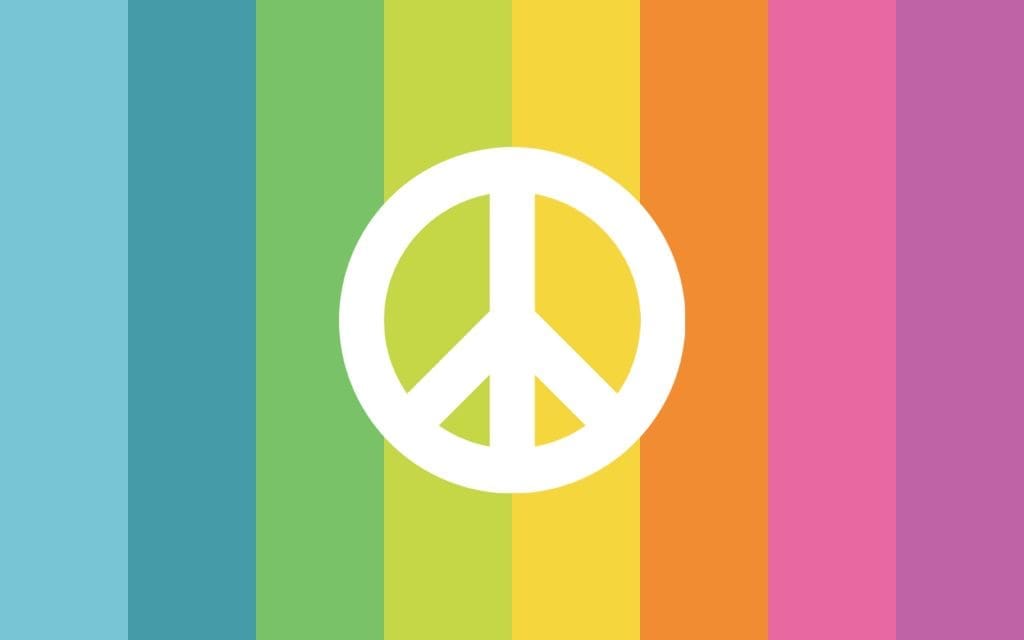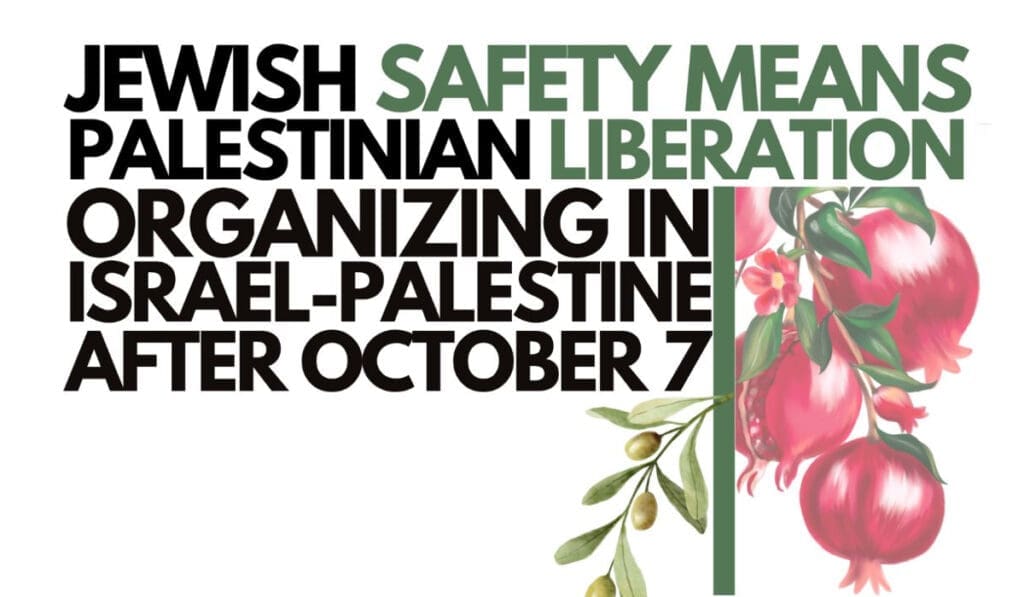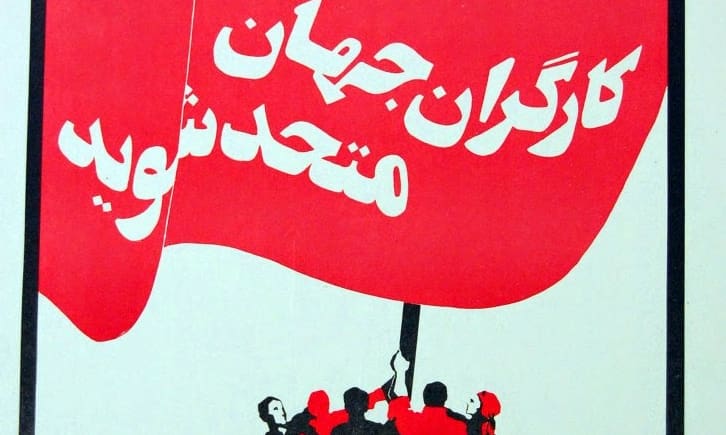The World at the Fucked Moment
by Conor O’Donnell for Big Nothing
16 December 2019 (original post)
For an understanding of conflict that is not centered on the narratives that bombard the Twitter feed, but informed through the experiences of those whom it is hardest to hear—those who make us, the privileged, uncomfortable.
I am hoping here to speak about many things. Mostly I want to talk about agency; my own discomfort in feeling I know things that people have experienced in a way I could never understand, but also the disregard for people’s stories which we see reproduced in mainstream news, where human activity is condensed into catchphrases. These ideas are reinforced by the statements and ambitions of nation-states and end up affecting the thinking of everyone. That is why the denial of people’s agency is so prominent, and I want to go against the rationalization of events that leads to it.
The systematic killing of people by states becomes a “conflict” or a “crisis,” reconciliation with states that kill becomes “peace,” everything becomes something that is packaged neatly for the news roundup. All the analysis and making sense of the violence in the world seems to occur with the complete removal of human activity. It seems to exist purely as a form of speaking over people, a game of chess with no pieces, a world with nobody in it but foreign policy experts and talking heads.
The stress that this creates has pushed me further into my reading, and also led me to seek out an occasion to hear the experiences that I had previously only read about. That is why I went to hear the founders of Enab Baladi speak in London, and why I wish to read as much as I can from Syrians about their experiences. Here I will share my thoughts on both of those things with the aim of contextualizing real experiences alongside the theoretical ideas I have from my reading. By doing so, I hope I can relate to people what my understanding of the fucked moment is, my attachment to the issue at hand, and to offer a challenge for an understanding of conflict that is not centered on the narratives that bombard the Twitter feed, but through the experiences of those whom it is hardest to hear—those who make us, the privileged, uncomfortable.
And they are speaking: a Syrian women-led revolutionary media collective
Two weeks ago now, I attended the launch of a book by the independent Syrian media outlet Enab Baladi, which is called Enab Baladi: Citizen Chronicles of the Syrian Uprising [free PDF courtesy of Hummus for Thought]. The collection of articles follows the journey and output that the newspaper has taken since its inception. I watched Kholoud Helmi, one of the founding members of Enab Baladi, speak on-screen (owing to passport issues which kept her from attending in person).
I thought I felt sick; my head was rejecting the cigarettes and I started to sweat, but my eyes made sure to record everything so as not to forget. Kholoud spoke of immense challenges and how far they had come—and how always behind their successes was loss and uncertainty. I cannot fully transmit the power and the effect of her words, coming through the screen and filling the room, covering each moment with meaning. I had been trying to put social concerns out of my head—the feeling of being a bystander or maybe even a fraud—and then her words took it all away. The stories in the books I have been reading are not mere stories; they are real human action, real agency, real emotion—what I thought was too much to bear was the perfect amount to carry with me.
The power in her existence is that it is inarguable, no matter how many hacks try to rewrite history before our eyes. Her words and the many other accounts, whether online or written, will become a permanent witness against the criminality of the Assad regime. Each person who spoke at the launch was undeniable in their authority and their authenticity; all I can try to do (if anything) is amplify their voices and words, and say the things that it is too dangerous for them to fully express from their unfree places.
Enab Baladi’s book begins with an essay by Joey Ayoub titled ‘An idea called Daraya,’ which I had previously read at al-Jumhuriya. He succinctly describes the hollow feeling that I have had since I began reading about Syria: that I did not want to be part of any left that mostly stayed silent but often actively slandered the revolution. Moreover, I don’t want to be part of a global system which keeps the same silence or fumbles through the motions of pretending to care. As Ayoub’s article argues, the people of Daraya “exposed the hypocrisy of a world that could let such atrocities happen…[And] by doing so, the world exposed itself as criminal.”
Syrians have shone a light on the complete moral bankruptcy and hypocrisy of each state that declares itself a defender of universal human rights, as they look on or shake the hands of states which lie and murder with impunity. This world is corrupt; unfit and unwilling to deal with the marginalized and the disappeared—and yet those same states sit down and pretend to tackle its greatest issues. This world gives a seat to the most blatantly murderous and criminal regimes in spite of its supposed values.
What right do these rulers have to take up their seat, any more than you or I do? Where is the chair for the free Syrian, the Yezidi, the Kurdish, the Uighur, or the Rohingya? Where is the seat for any individual to assert their dignity; which stands against this unfair system with more legitimacy than any of the corrupt national projects that whimper on our behalf?
As I went home on the train I read the first few short articles from the book I’d picked up. I felt the emptiness of my anger; each bulletin came with the optimism and confusion of the early days, of people finding their voice. I felt like I had totally lost my own and that I could only process internally but never let out what I had felt. Yet one of the simplest things I have learned from reading the writing of Syrians is what it means to speak. The price of a voice is what I have learned over and over, that mine is free, never twisted or appropriated, never silenced, so why not use it?
The truth is out there – but so are the “truthers.”
Yassin al-Haj Saleh is the most famous and one of the most crucial voices of the Syrian revolution. His many writings, which I will provide lots of links to, provide a full context and understanding of the social situation: the structure and unfairness of Syrian society, the cruelty of the regime, and the hopelessness of the world which allows it to go on existing. Aside from The Impossible Revolution—the only one of his numerous books to be translated into English—his critical ideas mainly appear in online articles, many of which can be accessed at al-Jumhuriya.
‘The Syrian Cause and Anti-Imperialism’ was my introduction to his writing, in which he argues that Syrians “are no longer relevant for our own cause”—such is the extent to which the explicit political demands of Syrians are overlooked that the country has become “an open book,” onto which people project their tired and useless ideas. This initial argument relates to all commentators on the conflict from afar, whether that is journalists from prestigious international news organizations, “peace-building experts” who overlook civilian concerns in favor of policy abstractions, or leftist groups which would have normally been part of solidarity efforts. However, both his article’s and my own focus is not to delve into the self-evident and long discredited outlook of the conservative right. Instead, it is to focus on how the same people who champion the Palestinian cause have come to obscure and even slander Syrians who fight the same tyranny.
One of the foremost concerns of this article is the lack of humility of the western left and its unwillingness to learn and to listen, particularly with regard to their harmful and specious “regime change” narrative. Despite its backing down on every ‘commitment,’ and the contortions and gymnastics which the US government has performed in order to stay as far as possible from deposing Assad’s regime, over the course of the slaughter leftists have more and more readily found an imperialist plot instead of finding the voices of dissenting Syrians. Lengthy histories of US policy towards Syria have been written which clearly explain that the two countries were more likely to be partners in the forever War on Terror than they were to be enemies of any real kind.
To reiterate this point, there is a quote from ‘An Idea Called Daraya’ from ex-CIA agent Robert Baer which highlights the fact that the US state is more interested in its own “security” concerns than overthrowing dictatorships: “If you want people to be well interrogated, you send them to Jordan. If you want people to be disappeared, you send them to Egypt. And if you want people to be tortured, you send them to Syria.”
Al-Haj Saleh points out that “the original change in Syria is our initiative, and it is our project”—exposing the paternalistic outlook of those who push the idea that Syria is simply a “regime change war.” This view is steeped in a Eurocentric analysis which centers the ambitions of major powers to the detriment of Syrians resisting fascism on the ground. As if they should not protest the Assad regime’s brutality and criminality, in case it somehow makes the US look good. Should they wait for the green light from western leftists while the bombs keep dropping? This discourse has no relation to a current reality in which people struggle for basic freedoms, including the right just to be seen and heard. It also absolves the Assad regime of its unrelenting cruelty, viewing it either as necessary in the overarching geopolitical battle, or merely as unimportant when considered against the greater imperial struggle.
I think it is crucial to see that this is a position which condescends; it is not based on an equality of understanding or a reaffirming of common dignity—it puts people’s struggles back into comfortable parameters; the War on Terror, the Islamist threat, the Cold War dynamic. Above all, it is cowardly. From our position of relative luxury we should be open and willing to defend resistance against a murderous political elite on its own terms—not on our terms. We should not fixate on an imagined impurity of people and their cause, because you don’t know who you may stand beside when fighting the fascist enemy.
An emerging global fascist consensus
Another momentous article from al-Haj Saleh’s oeuvre, of which my own title here is a more pessimistic and rude version, is ‘The World at the Fascist Moment.’ It is the republished foreword to the book The Holocausts We All Deny by Theo Horesh. The article reflects on the global ‘turning away’ of people from the violence which goes unchecked in the ‘fascist moment’ (Horesh’s term). It articulates a colossal failure: the lack of any real democratic impulse to challenge the increasingly normalized genocidal tendencies of many states, which call for “a permanent war against the future.” The Assad regime is certainly not alone in this tendency, just especially advanced and brazen. But because of the involvement of more powerful nation-states in Syria, the global-level failure to confront genocidal politics becomes clearer and more alarming there.
While al-Haj Saleh compares this moment to the European retreat in the face of Nazi Germany, I have found myself drowning in a nightmare, an upside-down rerun of the Spanish Civil War (which I endlessly studied in my younger years). In this fucked moment, the internationalists of old—who would have fought against Franco’s fascist regime—are instead arguing online that Paracuellos is proof enough of a smear campaign from the “supposed democracies.” I find the parallels striking, and I don’t wish to belittle either event with the comparison—just to highlight the irrationality of the current situation.
Syrians, as the Spanish republicans were, are at the mercy of their geography and the fascist regime which hunts them, its powerful backers totally unrelenting and eager to streamline the killing. Despite this, they are breaking societal barriers, protesting all forms of authority, and undertaking radical experiments in local democracy. There is also the same complete imbalance between the armaments of the rebels and the fascist onslaught, and a similar lack of interest from the self-appointed leaders of the democratic world. And the implications will be felt just as they were in the last century—giving the fascist forces a “far-away” playground to test their mettle (and materiel) doesn’t quench their thirst, it emboldens them. Yet there is little agenda, little focus, almost zero will for the violence to end. No major party in Europe has it at the top of their agenda and none of them have directly challenged the Russian state to end its involvement. All they have offered are vague statements towards a “peace” that could never exist without the acknowledgment of the explicit demands of Syrians. As Kholoud ended her remarks two weeks ago by saying: there can be no peace with Assad.
This is why the imbalanced relationship of ‘solidarity’ and the implications for global solutions are the greatest takeaway from this analysis of the fucked moment:
It is becoming more and more a relationship of power that soothes the conscience of those doing the solidarity at a cheap cost when they themselves lack nothing. What we truly need is partnership, to meet and to engage in dialogue, to think and work together for the one world which we inhabit together (Yassin al-Haj Saleh, ‘The World at the Fascist Moment’).
We cannot claim that we support peaceful solutions without looking straight on at the greatest cause of violence that affects Syrians today. Listening to their demands will show what is needed; the rest is just noise. This is one of the issues with online solidarity in general: as far as I can see there is little connection, little reaching out to those we don’t know enough about. It may sting to be told you are doing nothing, but that is the nature of the online game—it is mostly posturing. We have to keep looking and engaging with the world, to halt our collective trauma that we carry, and to know that action is caring.
Erasing resistance: the fatal hegemony of the War on Terror
The final article that I will reflect on is ‘Terror, Genocide, and the “Genocratic” Turn.’ In this text, al-Haj Saleh argues that terrorism, as understood and defined by Western states and corporate media, has led to a near total acceptance of the “legitimate violence” that states undertake, and has rendered all opposition under the label of terrorism. Owing to the US-led drive for security and anti-terrorism measures to become the forefront of international politics, intelligence agencies and state forces everywhere are free to harass and kill at an unchecked rate with no oversight. We see this in the behavior of many states; the US, Israel, Russia, China are all purveyors of the worldview that the violence they undertake has a legitimacy that non-state actors who try to resist them shall not be afforded.
I cannot stress the importance of this article enough, and almost cannot properly analyze it for fear of simply repeating it all in a less coherent manner. Each line is imperative and filled with creative arguments against the securitization of the political order, which has huge implications for refugees, protesters, the poor, the dispossessed—really for anyone who stands against or even just outside the current system—because of “an exception that has now become the global standard.” The exception has become the pretext which allows for the genocidal practices of states to go unnoticed or unpunished. The affected bring their cases to an unjust world with no power and are met with indifference. The global system prioritizes “anti-terror” measures above all—far above genocide and other organized fascist violence—and it does so at the expense of citizens everywhere. This passage from the article pounds this point home:
Terrorism is indeed an evil, but it is only one face of a global structure that produces various forms of discrimination, inequality, and racism. This progressively genocratic structure is the fundamental evil, and what makes it even more so is its claim to virtue by way of fighting savage entities like Daesh and al-Qaeda; something which makes even mass-murdering states such as Assad’s, and racist states such as Israel, and imperialist reactionary states such as Russia and the US, and ultra-reactionary states like Iran, forces of “good.”
That is why there was little attention paid to the devastation that the US, UK, and French forces visited on Raqqa. The same reason that both Israel and Saudi Arabia keep their seats at the table while civilians take the brunt of their violent actions. This violent ‘exception’ is the way that states, with the help of corporations, relate to each other now—by selling off the freedoms of their citizens to each other for a look at the latest shiny toy. This pretext to focus all their attention on terrorism has implications from air travel to warfare. It is the mark of a suspicious world that hides all its cards beneath the table, our leaders too scared and too obnoxious to confront themselves, so instead they hide and obscure all the meaning away. What we are left with is a lethal world based on prejudiced assumptions—one that leaves people stranded, mute, invisible, and dead, having never even looked them in the eye.
I hope to make a clear-headed call for us to analyze the global failure in front of us. I hope we can see how business is conducted, because it has nothing to do with our needs or our demands. We cannot rely on the elites of nation-states to define what is good conduct, because they repeatedly engage in murderous behavior, and they do so with each other’s approval, creating a loop of violence that we have no influence over. And our Western states, which forget they are built on and enriched through violence, still try to keep up the pretense of being a standard for decency. Despite the weapons they sell and the ease with which they look away, only their performative politeness soothes the conscience—to the point of numbness.
Our nations are increasingly consumed by their own myths and nationalistic social pressure—the reinforced narratives from the papers, the beating drum. There must be a proper rejection of all corrupt national projects—fuck the imperial states! They are bloated relics that swell on their shitty spoils. The same goes for the rest of our great powers, which only exist to fill their pockets and empty ours. Look at the fucked moment for what it is. Forget the pieces on the map that jostle for position; how can the people take back what is theirs?
Featured image: copies of Enab Baladi newspaper’s forty-fifth issue among the debris of a destroyed building in the city of Daraya, rural Damascus (December 2013). Source: Enab Baladi via Hummus for Thought.

